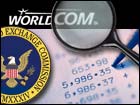
NEW YORK (CNN/Money) -
The head of a congressional committee probing the accounting scandal at WorldCom unveiled documents Monday showing that management tried to hide improper bookkeeping that may have stretched as far back as 1999.
Rep. Billy Tauzin, R-La.,chairman of the House Energy and Commerce Committee, said a series of documents reveal a pattern of dishonesty and financial manipulation from a struggling telecommunications company desperate to meets profit targets.
"Here is a message from management saying these are the numbers we want to report, go ahead and figure out how to report them," said Tauzin, interpreting one of the documents at a Washington press conference.
"This is fraud 101," Tauzin said.
Tauzin's committee is poring over five boxes of WorldCom documents received after the company made the June 25 announcement that it overstated five quarters of pre-tax profits by hiding expenses.
In investigating the scandal, the panel joins the Justice Department and the Securities and Exchange Commission, which has accused WorldCom of fraud.
Tauzin provided the news media with an early June memo prepared by internal auditor Cynthia Cooper, saying that Troy Normand, a finance department employee, went to his boss, Scott Sullivan, the former chief financial officer, to express concerns about the faulty accounting that brought the company to its knees.
The memo states that Sullivan, fired last month, said everything was OK. But Normand was uncomfortable enough to want to resign. But he did not tell an external or internal auditor for fear of his job, the memo said.
"Here is a middle management guy watching them cook the books, feeling uncomfortable and yet being unable to extricate himself from the situation," Tauzin said during the press conference.
The situation recalls that of Sherron Watkins, the Enron employee who questioned the energy company's accounting before it went bankrupt in December.
A June 26 memo from Steven Brabbs, an executive with the international division, signals that $33.6 million in costs may have been improperly recorded during the first quarter of 2000.
The memo was forwarded to Cooper, who discovered the $3.8 billion accounting scandal at the telecommunications company.
WorldCom could not be reached for comment.
Clinton, Miss.-based WorldCom (WCOME: Research, Estimates) has teetered on the verge of bankruptcy since June 25, when it made the irregularities public. The company reportedly has lined up debtor-in-possession financing from Citigroup, J.P. Morgan and G.E. Capital that would allow it to operate under a possible bankruptcy reorganization.
Overseas unit in focus
The memo from Brabbs reveals that improper booking of costs may have gone back as far as 2000, and Tauzin said the committee is reviewing WorldCom's books back to 1999 for additional accounting errors.
Brabbs, then head of the international finance and control unit, wrote of an incident that began in March 2000 that changed the unit's accounting. Once the international subsidiary closed its books for the first quarter of 2000, people in the United States made a journal entry that cut line costs by $33.6 million, Brabbs wrote.
"After phone calls and e-mails to the United States, we were told that the entry had been made on the basis of a directive from Scott Sullivan," Brabbs said in the memo. "Despite repeated requests, we were given no support or explanation for the entry."
WorldCom initially said the inflated profits began last year and extended though March.
But the House committee's documents showed that in April 2000, Brabbs reviewed the first-quarter results with the U.K. audit partner and senior manager. Brabbs then suggested that "the auditors should request follow-through in the U.S. to ensure appropriate accounting treatment was in place," the executive wrote in the memo.
The relevant information also was sent in a report to Arthur Andersen and senior WorldCom finance management in the United States, the document said.
Andersen, fired by WorldCom this spring, was found guilty of obstructing justice in the Enron matter.
An Andersen spokesman confirmed the accounting firm was first informed of the issues in the third quarter of 2000.
"WorldCom management assured that the issue was being corrected and told us that a charge was being booked in the third quarter in the U.K.," a spokesman said Monday.
Still Andersen has defended its work, shifting responsibility to Sullivan. Sullivan and former CEO Bernard Ebbers declined to testify before the House Financial Services Committee, which held hearings last week. They invoked their Fifth Amendment rights against self-incrimination.
David Myers, WorldCom's controller who resigned last month, "was not pleased" that Andersen had been told without his knowledge, the Brabbs memo said.
Brabbs told Myers that he did not think the entry was incorrect, only that "we had no support for it in international and that it was appropriate, therefore, to request justification (or alternatively a corresponding and reversing entry) from the U.S.," he said.
The next quarter, WorldCom's senior management suggested that the unit make the expense transfers at its level rather than at the high corporate level. Brabbs refused, but was then ordered to make the entry and the order was understood to come from Sullivan, the June 26 memo said.
Brabbs still was uncomfortable and chose to establish a "management company," which was not a legal entity, and post the costs there. Throughout 2000, Brabbs continued to voice his concerns about the entry but was told by senior finance management that the entry was made "at Scott Sullivan's direct instruction."
The documents come as WorldCom's delicate financial situation raises questioned about its survival. Heavy in debt, the No 2 long-distance phone service provider faces client defections. The new CEO, John Sidgmore, has called bankruptcy possible.

|

